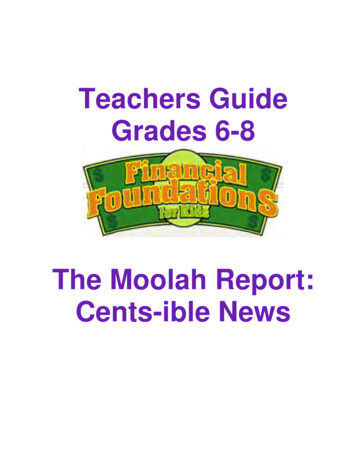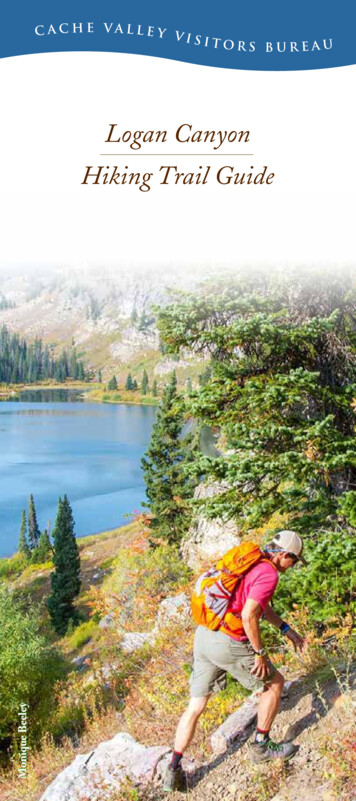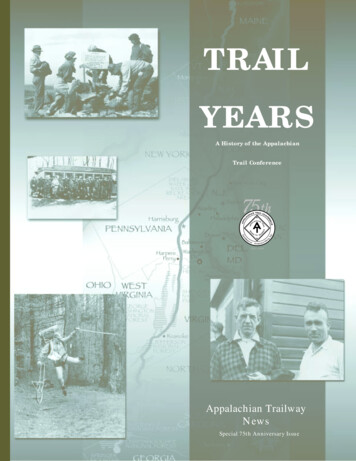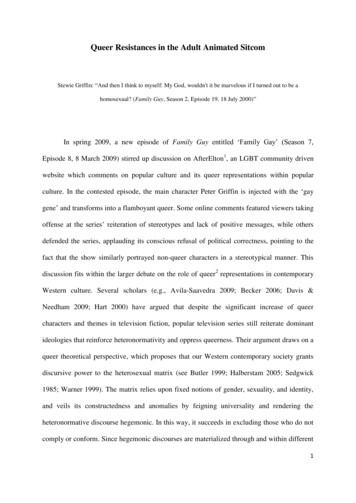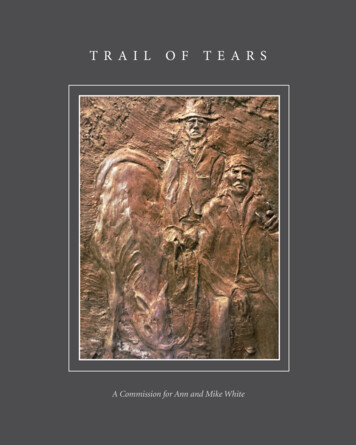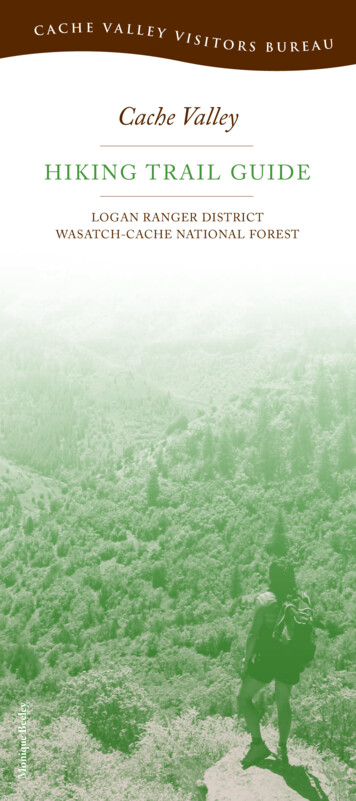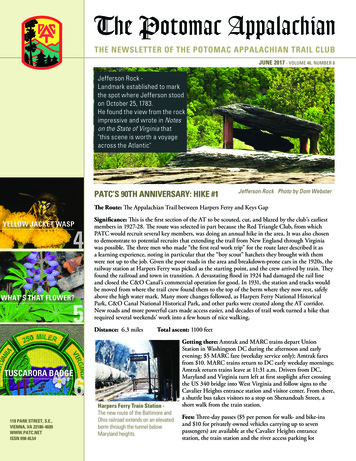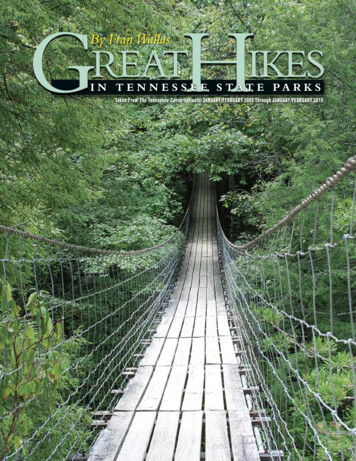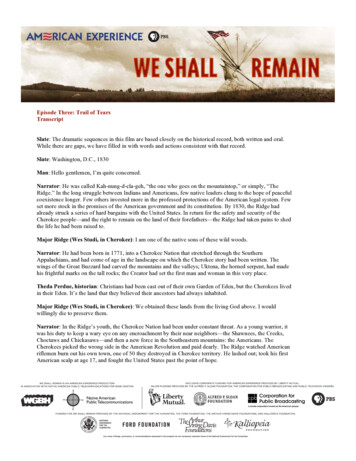
Transcription
Episode Three: Trail of TearsTranscriptSlate: The dramatic sequences in this film are based closely on the historical record, both written and oral.While there are gaps, we have filled in with words and actions consistent with that record.Slate: Washington, D.C., 1830Man: Hello gentlemen, I’m quite concerned.Narrator: He was called Kah-nung-d-cla-geh, “the one who goes on the mountaintop,” or simply, “TheRidge.” In the long struggle between Indians and Americans, few native leaders clung to the hope of peacefulcoexistence longer. Few others invested more in the professed protections of the American legal system. Fewset more stock in the promises of the American government and its constitution. By 1830, the Ridge hadalready struck a series of hard bargains with the United States. In return for the safety and security of theCherokee people—and the right to remain on the land of their forefathers—the Ridge had taken pains to shedthe life he had been raised to.Major Ridge (Wes Studi, in Cherokee): I am one of the native sons of these wild woods.Narrator: He had been born in 1771, into a Cherokee Nation that stretched through the SouthernAppalachians, and had come of age in the landscape on which the Cherokee story had been written. Thewings of the Great Buzzard had carved the mountains and the valleys; Uktena, the horned serpent, had madehis frightful marks on the tall rocks; the Creator had set the first man and woman in this very place.Theda Perdue, historian: Christians had been cast out of their own Garden of Eden, but the Cherokees livedin their Eden. It’s the land that they believed their ancestors had always inhabited.Major Ridge (Wes Studi, in Cherokee): We obtained these lands from the living God above. I wouldwillingly die to preserve them.Narrator: In the Ridge’s youth, the Cherokee Nation had been under constant threat. As a young warrior, itwas his duty to keep a wary eye on any encroachment by their near neighbors—the Shawnees, the Creeks,Choctaws and Chickasaws—and then a new force in the Southeastern mountains: the Americans. TheCherokees picked the wrong side in the American Revolution and paid dearly. The Ridge watched Americanriflemen burn out his own town, one of 50 they destroyed in Cherokee territory. He lashed out; took his firstAmerican scalp at age 17, and fought the United States past the point of hope.
Russell G. Townsend, historic preservationist: For a generation of Cherokees that destruction was all theyknew. They had seen their world kind of evaporate around them.Narrator: The Cherokee Nation was still on its knees in 1805. Its population had dwindled to 12,000, and ithad lost more than half its land. Even after the Cherokees and other tribes had signed peace treaties with theUnited States, The Ridge knew the safety of his people was not a given thing; he understood that the centralconflict still pertained: the United States meant to have what was left of the Cherokee homeland. Ridge meantto save it. But he knew that this battle with the United States required a nimble and artful new approach.Preserving the Cherokee Nation meant walking for a time down the new path America was offering.John Gambold, reverend (Robert Hatch): Please accept this, Brother Ridge, as a small gift.Major Ridge (Wes Studi, in Cherokee): Thank you. Thank you John. After we eat lets enjoy this together.Theda Perdue, historian: The United States at the end of the American Revolution developed a policy calledcivilization. It helped fund missionary organizations to go into the Indian nations, particularly in the south,and teach Indians how to be Anglo Americans: how to grow wheat instead of corn; how to eat meals atregular times instead of when they were hungry; how to dress in European clothing; how to speak the Englishlanguage; how to pray in church at designated times; how to live the kind of life that Anglo Americansbelieved was a civilized life.Gayle Ross, descendant of Chief John Ross: The promises of the United States Government were that if theCherokees, the Creeks, the Choctaws, the Seminoles, the Chickasaws could somehow assimilate ways ofliving that were more like their white neighbors that they could be the political and social equal of their whiteneighbors. Literally Thomas Jefferson once assured the Indian leaders in a speech that he believed they couldbecome the equal of white people.Narrator: “You will unite yourselves with us,” President Jefferson said, “join our great councils and formone people with us. And we shall all be Americans. You will mix with us by marriage. Your blood will runwithin our veins and will spread with us over this great continent.”Daniel Ross (Jackson Walker, in Cherokee): Bear. Good Afternoon.Bear (Anthony Currne Lett, in Cherokee): I need a part for my gun.Daniel Ross (Jackson Walker): John! Flintlock!Narrator: John Ross, the future Cherokee chief, grew up at the crossroads of an emerging world where whitesettlers and Indians were just beginning a strange new dance of accommodation.Bear (Anthony Currne Lett, in Cherokee): Thank you!Narrator: John’s mother Mollie, a member of the Bird clan, had married a Scotsman, Daniel Ross. Ross wasamong the growing number of white men who took Cherokee wives, and gained access to land and trade inthe bargain.Daniel Ross (Jackson Walker): John.2
Gayle Ross, descendant of Chief John Ross: There would have been manydifferent classes of Cherokee making their way in and out of the store, from the full-blood traditional peopleto the wealthier mixed-blood families that were just beginning to establish themselves.Narrator: The Ross’s spoke English at home; John had English-speaking tutors. But John Ross was aCherokee because of his mother’s blood—an accepted member of the Bird clan. He grew up surrounded bypeople whose lives ran to traditional Cherokee rhythms. He was proud to have a Cherokee name, “Koo-weeskoo-wee,” or “mysterious little white bird.”Daniel Ross (Jackson Walker): John.Gayle Ross, descendant of Chief John Ross: There’s a story that’s told about the time when he was five.And his father had bought a new little suit for him to wear at the time of Green Corn Dance. And his motherdressed him up in his white man’s suit. And the other children teased him so unmercifully that supposedly hecame back home and insisted on being allowed to change into the everyday clothes of the other Cherokeechildren before he would go back out and join the festivities.Narrator: Cherokee land—all of it—was owned in common by the tribe, but any Cherokee could work andimprove as much land as personal energy and private resources allowed. And The Ridge and his wife,Susannah, were energetic and resourceful homesteaders; exemplars of “civilization.” As the years went by,and The Ridge’s farming wealth grew, U.S. agents would occasionally receive optimistic reports from theRidge family. Major Ridge, as he was now called, knew what they wanted to hear: “I take pleasure to statethat every head of his household has his house and farm. . . . The poorer class . . . very contentedly performthe duties of the kitchen. They sew, they weave, they spin, they cook our meals and act well.”Major Ridge’s hope for the future was a group of educated young men who could build a strong newCherokee Nation, reckon U.S. laws and government and outsmart federal negotiators who were after theirland. His greatest hope was his own son. John Ridge was a frail boy; hampered by a disease that occasionallymade it difficult to walk, but the Major recognized his son’s strengths. When the U.S. War Departmentoffered to pay tuition for John and his cousin, Elias Boudinot, at a missionary school in Connecticut, MajorRidge grabbed the chance.Major Ridge (Wes Studi, in Cherokee): It will be hard for you, but you must conduct yourself well amongthe white people. When you finish school and return home you can help us.Susannah Ridge (Carla-Rae Holland, in Cherokee): Little one, don’t forget where you grew up. Learn adifferent way, but don’t forget. Goodbye. We will see each other again.Elias Boudinot (Will Finley): So I read your essay.Narrator: John Ridge grew to manhood among white Christian educators, absorbing the lessons of the bibleand the U.S. Constitution alike. Even 900 miles away from Cherokee Territory, he never betrayed a hint ofpain at his separation from home and family.Jace Weaver, writer: Even from his earliest school days, John Ridge is described by his teachers as beingcold, a little bit aloof, as being haughty. They compare him to his cousin, Buck, who became Elias Boudinot,who was much friendlier, much more congenial, but not as good a student. John Ridge was brilliant.3
Narrator: The faculty selected John Ridge, out of all the Indian students at Cornwall, to prepare an essay forPresident James Monroe. In it, he sang the praises of his Christian benefactors, and his own parents: “Myfather and mother are both ignorant of the English language, but it is astonishing to see them exert all theirpower to have their children educated, like the whites!”For all his scholarly achievements, John Ridge’s fragile health failed in the New England winters. He spentmuch of his time in his room, attended by the school steward’s daughter, Sarah Bird Northrup, until a doctoralerted her mother that the two seemed to have fallen in love. When Sarah confessed, the Northrups sent heraway to live with relatives, the entire affair kept secret. It took nearly two years, but John won over Sarah’sparents. He regained his health, qualified as a lawyer, and promised to take care of their daughter.Minister: Do you thus solemnly and sincerely engage and promise?John Ridge (Wesley French): I will, with the help of God.Minister: And you Miss Sarah Bird Northrup, with your right hand, take Mr. John Ridge by his right hand. Inthe presence of God and these witnesses, do you take, John Ridge, whom you now hold by the hand, to beyour wedded husband, to have and to hold from this day forward . . . forsaking all others, keep only unto him. . . conducting yourself toward him in all respects, as a kind and tender, virtuous and faithful wife . . .Protestor #1: This marriage is a sin in God’s eyes!Protestor #2: Shame on you!Protestor #3: Shame!John Ridge (Wesley French): Go! Go!Jace Weaver, writer: The reaction of New England whites—enlightened, progressive New Englandwhites—makes a mark on him. He had been told, ‘get an education, take up western ways, you can be part ofus.’ He will never believe whites in exactly the same way again.John Ridge (Wesley French): An Indian is almost considered accursed. The scum of the earth areconsidered sacred in comparison. If an Indian is educated yet he is an Indian, and the most stupid andilliterate white man will disdain and triumph over this worthy individual.Narrator: While John Ridge was away in Connecticut, John Ross was a young man on the rise. A trader likehis father, Ross cashed in selling food and provisions to the well-funded Christian missions sprouting aroundthe Cherokee Nation. He married a Cherokee woman and made a home on 420 prime planting acres. But Rosswas drawn more and more into the troubled state of Cherokee diplomacy. The Cherokee Nation’s longalliance with United States was fraying. Washington was dragging its feet on payments owed under the termsof earlier treaties, and strong-arming the Cherokees to sell off more territory. The Cherokee Nation hadformed a powerful new central government to push back, determined “never again to cede one more foot ofland.” And they needed able English-speaking men like John Ross to articulate the Cherokee position to theUnited States government.Jace Weaver, writer: John Ross was not from a prominent Cherokee family the way John Ridge was. ButRidge takes John Ross kind of under his wing as a protégé. Here in John Ross he’s got someone who’s only4
an eighth Cherokee, is very familiar with white society because of his father. Equally adept at negotiatingboth of those worlds.Narrator: With strong leaders like Ross and the Ridges, the Cherokees could hold the United Statesgovernment to its word for a while, but the situation on the ground was changing nonetheless. As dreams ofcotton wealth drove prospective planters deep into the interior south, other tribes were giving up huge swathsof neighboring lands. The 14,000 Cherokees found themselves surrounded on every side by Americansettlers; scores of whites began to scrabble onto Cherokee farmland. A small group of Cherokees had alreadytaken America up on its offer of new land west of the Mississippi, in Arkansas Territory. But the CherokeeNational Council, to a man, was still confident it had the strength to stand its ground. Major Ridge, for one,had much to defend: nearly 10 million acres owned in common by the tribe, and his own plantation.According to the U.S. Superintendent of Indian Affairs, Ridge’s farm “was in a higher state of cultivation andhis buildings better than those of any other person in that region, the whites not excepted.” In 20 years, Ridgehad cleared nearly 300 acres for cash crops: cotton, tobacco, wheat and indigo; he oversaw his own orchard,dairy and vineyard—and as many as 30 slaves.John Ross, descendant: John Ross owned slaves and John Ridge, when he got married, Major Ridge gavehim like 20 slaves. And so he was a slave owner also.Jace Weaver, writer: About eight percent of Cherokees owned slaves. They were mainly the mixed-bloodelite. But more and more that mixed-blood elite is adopting the lifestyle of the Southern planter culture.John Ridge (Wesley French): We did so well with tobacco in the past that we’re thinking of adding to that,or perhaps even some cattle.Susannah Ridge (Carla-Rae Holland, in Cherokee): (line in Cherokee)Major Ridge (Wes Studi, in Cherokee): (line in Cherokee)John Ridge (Wesley French): My father says the rains were heavy here and the cotton was planted late, butcotton prices are rising again.Major Ridge (Wes Studi, in Cherokee): (line in Cherokee)John Ridge (Wesley French): My father apologizes to you ma’am. He says the cost of your fine dresses isgoing up.Major Ridge (Wes Studi, in Cherokee): ToastNarrator: Not all Cherokees welcomed these new opportunities. “Civilization” was beginning to draw hardclass distinctions that had never existed in traditional Cherokee society. The lives of most full-bloodCherokees were still marked by loss. What little remained of their old hunting grounds was played out. Theydepended almost entirely on subsistence farming. And they worried that their leaders were in thrall to theways of the whites. But there were still elemental ties that bound all Cherokees, and change that benefited all,including a signal advance by a Cherokee named Sequoyah.Gayle Ross, descendant of Chief John Ross: Sequoyah was devoted to enabling the Cherokee people tohave at their command an essential power that he saw white society have, that being the ability to write in the5
Cherokee language. Ultimately he did something that no one has ever done and that was create a system ofreading and writing in a language when he himself could not read or write in any other language.Chad Smith, Principal Chief, Cherokee Nation: There was one character for every syllable. So with 86syllables a Cherokee speaker could learn to write in several weeks. And it’s actually much more efficient andeffective than you could ever ask of English.Gayle Ross, descendant of Chief John Ross: Within a matter of a few years theCherokee Nation was literate. The Cherokee Phoenix, the translation of the Bible into Cherokee. Familystories were written down. Medicine people wrote down all of their formulas for healing. It literallyrevolutionized Cherokee society.Narrator: At the end of the 1820s, Major Ridge saw a new Cherokee Nation on the rise. Cherokeepopulation grew every year. Its National Council was stronger than ever, and a new generation had come ofage. John Ridge had taken a seat on the council. And one of the most impressive new young leaders was JohnRoss.John Ross, descendant: John Ross he didn’t look like a real full-blood Cherokee, but the full-bloods, theCherokee people, trusted him. He was what they looked for in a leader, and he was in for the common people.Narrator: Among the traditional full-blood Cherokees—who made up the overwhelming majority of thetribe—John Ross gained a reputation for integrity. While serving under the principal chief, Ross had becomean eager student of the abiding Cherokee ways. It was Ross who authored a new constitution that allCherokees could embrace. Ross’s constitution created a democratically elected government mirrored on theUnited States. There was an executive, a legislative and a judicial branch. A strong National Council wasvested with the power to protect all Cherokee land.Carey Tilley, Cherokee Heritage Center: This is the culmination. This is a culmination of a movement andis probably the greatest unity that the Cherokee people had ever seen.Narrator: The new constitution drew bright and indisputable borders around Cherokee territory, and declaredthe Cherokee Nation’s absolute sovereignty within those borders.Jace Weaver, writer: Georgia reacts to the Cherokee passage of a constitution in 1827 very badly. They say,“If they set up a constitutional government we’ll never be able to get rid of them.”Narrator: “The absolute title to the lands in controversy is in Georgia,” read one resolution, “and she mayrightfully possess herself of them when, and by what means, she pleases.”“These misguided men,” a state legislator said of the Cherokees, “should be taught that there is no alternativebetween their removal beyond the limits of the state of Georgia and their extinction.”As the Georgia legislature began to kick back, other more ominous events were unfolding: the discovery ofgold in Cherokee territory, which caused a stampede of white prospectors, and the first stirring of a populistpolitical movement that sent tremors through Indian lands all over the East. This hard-edged new movementfound voice in Andrew Jackson, whose ascent to the presidency in 1829 owed to the newly enfranchisedSouthern frontiersmen. In his first address to Congress, President Jackson announced his intention to do as his6
voters pleased, which is to say, rid the East of the Indian tribes once and for all. He championed newlegislation giving him power to offer the tribes land west of the Mississippi if they would go nicely.Gayle Ross, descendant of Chief John Ross: The Indian removal bill was Jackson’s first priority once hewas in office. It became the first major focus of his administration. It did reflect a fundamental shift in theway that America was beginning to define itself. Not very many people in Georgia and Tennessee, Alabamaat that time were willing to even go so far as to say that Indian people were people.Carey Tilley, Cherokee Heritage Center: The thinking of the day becomes more racist that the Cherokeesare inferior and cannot be like the whites. It’s convenient rhetoric to say that Cherokees are inferior and weneed to get them out of the way, out of harm’s way, as Jackson would put it.Narrator: Other tribes read the bleak signs, and reluctantly began to prepare for removal. But the Cherokeesreached out for support among their friends and benefactors along the Eastern seaboard.Jace Weaver, writer: The Cherokees were one of the “civilized tribes.” They had made such strides. So theycut a sympathetic figure to northeasterners.John Ridge (Wesley French): I ask you. Shall red men live, or shall they be swept from the earth? It is withyou, and this public at large, the decision chiefly rests. Must they perish? Will you push them from you orwill you save them?Narrator: The Congressional debate over the Indian Removal bill was a sectional brawl that drew the entirecountry’s attention. A campaign organized by “Benevolent Ladies” flooded Congress with pro-Indian lettersand petitions. “Who can look an Indian in the face,” one Senator thundered, “and say to him: for more than 40years we have made to you the most solemn of promises; we now violate and trample upon them all, but offeryou, in their stead, another guarantee.” New England Senators voted 11-1 against Jackson’s removal bill. Butthe unanimous bloc of Southerners assured its passage in the Senate. The vote was closer in the House —102-97. But the legislation passed. And President Andrew Jackson’s signature made Indian removal the lawof the land.Carey Tilley, Cherokee Heritage Center: The State of Georgia basically said to its citizens this land isyours. They divided up with the land lottery and basically, uh, told their people to have at it.Narrator: The While white settlers bought up lottery tickets—and a chance at Cherokee land—the Georgialegislature bent itself to obliterating the state within its state, passing new laws overriding Cherokeesovereignty. Meetings of the Cherokee legislature and courts were deemed illegal. All people residing onCherokee land were now subject to Georgia law. Missionaries who had lived among the Cherokees for yearswere forced to sign oaths of allegiance to Georgia. Those who refused were jailed.John Ross, descendant: And Jackson basically told Cherokees that he couldn’t do anything about it. It wasstate rights. And you know they couldn’t have any protection from the federal government. The only waythey were gonna get protection was if they moved.Narrator: Making a plan to battle Andrew Jackson and Georgia fell to the Cherokees newly-elected PrincipalChief. Major Ridge had decided not to run for the office, asserting that the Cherokees would be best servedby an English-speaking Chief. His own son was too young, so the Ridge backed John Ross. At 38, Rosshimself was barely eligible, but he won election easily. And one of his first acts in office—rewriting the7
Blood Law—sent a clear signal: any Cherokee who made a deal to sell land to the United States without theconsent of the entire tribe faced dire consequences. “Citizens of this nation,” the law read, “may kill him orthem so offending, in any manner most convenient.” Chief Ross then set out to shame Jackson and thesupporters of Indian removal, and he was going to use the United States federal courts to do it.John Ross (Freddy Douglas): .at least what is left.Narrator: Along with America’s most esteemed advocate—former attorney general William Wirt—Ross andhis closest advisers began to frame the Cherokees argument for self-determination in their own territory.Cherokee Leader, (Andrew Hair, in Cherokee): Of course we are a separate people. Who does not knowthis?Major Ridge (Wes Studi, in Cherokee): We have made many treaties giving up our lands. Were we not asovereign nation, to sign these treaties?Narrator: The Cherokee Nation and their supporters filed more than a dozen separate suits in federal court;two made it all the way to the Supreme Court of the United States. The question in both cases was the flashpoint of American politics in 1830: where did federal authority end and states rights begin? Did federaltreaties with the Cherokee Nation supersede Georgia state law? Or could Georgia do as she pleased within herborders.The Court dodged the question in the first case, but in the second, Worcester v. Georgia, it could not. SamuelWorcester, a missionary who lived in the Cherokee Nation, had been jailed by Georgia officials for refusingto take an oath of allegiance. Wirt argued that his arrest was unconstitutional, that Cherokee tribal laws couldnot be written over by the state of Georgia. The opinion of the Court, written by Chief Justice John Marshall,could not have been more clear: “The Cherokee nation is a distinct community,” Marshall wrote, “occupyingits own territory, with boundaries accurately described, in which the laws of Georgia can have no force, andwhich the citizens of Georgia have no right to enter but with the assent of the Cherokees themselves.”Chad Smith, Principal Chief, Cherokee Nation: What else could you ask for but a very clear andsympathetic order of the highest court in the land interpreting the supreme law of the land. The Cherokeesjust were ecstatic.Gayle Ross, descendant of Chief John Ross: They followed the law. They followed this policy of agovernment-to-government relationship, and the Supreme Court decision was a complete vindication.Jace Weaver, writer: Now, finally, this was their victory. Now they’ll have some protection.Narrator: John Ridge was still in Washington when he got word that the state of Georgia was refusing torecognize the Supreme Court decision or the sovereignty of the Cherokee Nation.Jace Weaver, writer: He goes to the White House and gets an audience with President Jackson. He askedhim bluntly if he will force Georgia to comply with the Supreme Court’s order and Jackson says, he will not.Gayle Ross, descendant of Chief John Ross: Andrew Jackson—the only president in the history of theUnited States to openly defy a Supreme Court order. He is said to have remarked that Chief Justice Marshallmade his decision. Let him enforce it. And to the Georgians he said, “Light a fire under them. They’ll move.”8
John Ridge (Wesley French): It’s over. He wants us gone. Even those we call friends say we can’t resistanymore.Major Ridge (Wes Studi, in Cherokee): And you? Do you think we have no choice anymore?Chad Smith, Principal Chief, Cherokee Nation: The political reality is setting in. The issues became moreclear. You could stay and fight, or stay and resist, or leave. And it was a very painful decision. It was anemotional decision. It was the United States driving us intentionally into that choice.Narrator: Once Jackson had openly sided with Georgia, every day brought fresh stories of Cherokees beingwhipped, run from their farms, and even killed by white Georgians; and the Cherokee Nation didn’t have thestrength to fight them off. When the United States renewed its offer of a cash settlement for Cherokeeterritory and a grant of land west of the Mississippi, the Ridges were ready to listen.Carey Tilley, Cherokee Heritage Center: At this point, the Ridges see the yielding of land as inevitable.What it’s coming down to in their minds is a choice between preserving their land or preserving theirsovereignty. So they believe it’s more important to remain a sovereign nation and distance themselves fromthe threat that’s, imminent.John Ridge (Wesley French): I’m told it is much like here. We will come to think of it as home.Cherokee Leader (John Ketcher, in Cherokee): If that land is rich, like ours here why is no one livingthere?John Ridge (Wesley French): Well, it is far. Too far for others, but not for us.John Ross (Freddy Douglas): They would have us leave our land, and take up way out the west, here.Traditional Cherokee #1 (Aaron Hair, in Cherokee): What are you doing to stop this?Traditional Cherokee #2 (Robert Girty, in Cherokee): You are the Chief! Who can say we have to leave?Traditional Cherokee #3 (Andrew Hair, in Cherokee): You must stop those who betray us. This land isours!Traditional Cherokee #4 (Woodrow Ross, in Cherokee): It’s true, what we’re saying.Narrator: John Ross was a man in the middle. He knew where the people stood, but the Ridges wereCherokee aristocracy, esteemed leaders in the Nation. The family had plenty of friends in the US government.And Ross was not happy that John Ridge was preparing to run against him for principal chief in the upcomingtribal elections. This sort of infighting, Ross believed, invited peril. He’d seen federal negotiators divide andconquer the leadership of every other nearby tribe. Unity, he knew, had been the Cherokees salvation; thetribe had to speak to the United States with one voice.Russell G. Townsend, historic preservationist: I think he heard the traditional voice and felt compelled byit, felt sense a duty to it. Certainly he had 16,000 people telling him to stay. I think he wanted to do whatthose voices were telling him to do.9
Carey Tilley, Cherokee Heritage Center: The Ridges kept saying publicly, ‘if we could if we could just talkto the to the Cherokee people then we can convince them that this is our only option.’ And they felt like JohnRoss was being heavy handed in keeping them from speaking as openly as they liked to.Narrator: “The duty of the minority to yield and unite is sanctioned by patriotism and virtue,” Rossproclaimed. Then, citing a national emergency, he suspended the upcoming tribal elections.Jace Weaver, writer: When John Ross cancels elections, now there’s a real block to John Ridge everassuming what he knows to be his rightful position. He sees John Ross as a dictator. And he grows to hate theman in a very visceral way.Narrator: The United States and Georgia got the scent of blood, and dug deep at the rift that had openedbetween Chief Ross and the Ridges. Federal agents kept close contact with members of the Ridge faction, andlet it be known among all Cherokees. Ross’s allies fanned rumors that the Ridges were illegally negotiatingaway Cherokee land, and reminded the Ridge Party that the penalty for selling land without the consent of thetribe was death. By the time the tribal leaders gathered for an emergency session at the Red Clay CouncilGrounds in the summer of 1834, John Ross had taken aim at his old friend, Major Ridge.John Ross (Freddy Douglas): My fellow countrymen. The matter before us is most urgent. If the UnitedStates shall withdraw their solemn pledges of protection, deprive us of the right of self-government, and wrestfrom us our land, then, in deep anguish of our misfortunes, we may justly say there is no place for us. Noconfidence left that the United States shall be more just and faithful towards us in the barren prairies of theWest, than when we occupied the soil inherited from the Great Author of our existence.Crowd: No treaty for land! No one can give away our lands!Major Ridge (Wes Studi, in Cherokee): My people, my people.Crowd: N
Episode Three: Trail of Tears Transcript Slate: The dramatic sequences in this film are based closely on the historical record, both written and oral. While there are gaps, we have filled in with words and actions consistent with that record. Slate: Washington, D.C., 1830 Man: Hello gentlemen, I’m quite concerned. N


